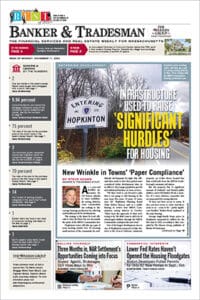
A rendering shows a boater's-eye view of a notional soccer stadium for the New England Revolution proposed by The Kraft Group on Everett's Mystic River waterfront. Image courtesy of The Kraft Group
Legislation paving the way for a soccer stadium in Everett scored a favorable committee report, and while the bill’s hometown sponsor is revved up about “getting everything going,” the bill appears to be on the Senate backburner for at least this month.
Sen. Sal DiDomenico’s bill (S.2692), which seeks to change the designation for a blighted land parcel along the Mystic River, advanced out of the Joint Committee on Economic Development and Emerging Technologies on April 25, about three weeks after its public hearing, and was shipped to the Senate Ways and Means Committee.
The land, currently occupied by a defunct power plant, is seen as a potential future home of Robert Kraft’s New England Revolution, the Major League Soccer team that currently plays at Gillette Stadium in Foxborough.
Asked whether Senate Ways and Means Chairman Michael Rodrigues supports the bill and of any plans for the legislation, a spokesman indicated there’s no immediate time window to take up the issue.
“The bill is currently being reviewed by Senate Ways and Means staff, but as the Committee’s top priority is processing the expected 1,000+ amendments next week, and then preparing for the [fiscal year 2025] budget debate the following week, there’s no timeline currently for further action on this legislation,” Rodrigues spokesman Sean Fitzgerald said in a statement.
The House and Senate have previously endorsed language meant to spark stadium construction.
‘I’m Pushing Hard for It’
DiDomenico’s bill looks to remove a 43-acre land parcel, situated partly in Boston and Everett, from its “designated port area” status “for the purpose of converting the parcel into a professional soccer stadium and a waterfront park.” If approved, the bill would launch a multi-year permitting effort, including transportation and environmental reviews from the state, on top of local zoning approval.
DiDomenico, an Everett Democrat, described the bill as a priority this week.
“We’re actually working on right now trying to figure out timing out of it,” DiDomenico said. “I know that I’m pushing hard for it. It’s a bill that we want to see get done this session so we can start the process of getting the public engagement going and getting everything going.”
Asked whether he’s discussed the bill with Rodrigues, DiDomenico said, “I’m talking to everybody.”
“This bill is similar to what we passed in the past,” DiDomenico said. “Obviously, trying to find some space for it with the busy schedule that we have, and we have bond bills coming up too, so we’re also trying to find a good time to do this.”
Boston Seeks Seat at Table
Rep. Jerry Parisella, co-chair of the Economic Development Committee, said the panel unanimously reported out the bill without making any revisions.
During an early April hearing, Parisella sought to ensure that surrounding communities, including Boston, would be included in planning conversations surrounding the potential stadium.
Parisella on Wednesday suggested lawmakers may need to explicitly outline that community input in a final version of the bill, though he emphasized municipalities would already have the opportunity to weigh in during the state’s environmental review process. A spokesman for Boston Mayor Michelle Wu did not respond to a request for comment about the bill’s favorable report.
“I think there might be some misconception that if this bill passes, suddenly there’s a soccer stadium in Everett. There’s still a long way for that to happen, including a pretty extensive environmental review,” Parisella told the News Service. “It is a severely contaminated site, and from what I understand, there’s limited options for development there, so it’s possible this could be cleaned up and turned into a useful site.”
Maggie Sullivan, senior attorney at the Conservation Law Foundation, has said the group opposes DiDomenico’s bill and is concerned that removing the DPA could harm the state’s clean energy goals. At the hearing, Sullivan called “spot zoning,” or creating zoning carveouts for a specific land parcel or developer, “bad planning.”
Parisella said there’s precedent to removing a DPA status, as he cited a successful waterfront restaurant in Beverly that was approved after a lengthy court battle.
Everett Mayor Carlo DeMaria called CLF’s accusation of spot zoning “totally wrong.” Redeveloping part of the property could generate new tax revenues for Everett and bolster public transportation linking the city to Boston, DeMaria told the State House News Service Thursday.
“It’s not spot zoning – it’s actually allowing the community to be able to prosper,” DeMaria said. “I think you have a lot of support on Beacon Hill. I think a lot of the leaders, and those in leadership on both sides, recognize and realize this is a parcel that has been shuttered, underutilized, blighted, contaminated and needs to be redeveloped.”
The land parcel under consideration, located across from Encore Boston Harbor, was purchased by Wynn Resorts several years ago. Chris Gordon, president of the company’s development arm, told lawmakers he’s unsure what will happen to the property without the zoning designation change.
“We have no plans to develop it. We have no plans to remediate it, and we do not plan to invest any more money,” Gordon said at the hearing. “It is likely to sit there idle for years to come, blocking the economic development and reputational benefits that Everett has long pursued.”





